When Two Wrongs Finally Make a Right
A story about giving
Slow Learning
These learnings do not come to me easily. And by easily I mean through simply taking a course or a degree. These learnings are deeply felt, like a prize fighter feels an upper cut from being in the ring and in the heat of the battle. Neither are these lessons from a bolt of lightning, quick, sharp and impactful. No, these are experiences that are more akin to understanding by the air temperature that the seasons will be changing soon. Which is to say, it took time to comprehend, to age through seasons, and to feel those changes. It took questioning and seeing the patterns year on year, time and again until it was real and normal, and that this was the state of how things were.
Academia only solidified the real work and gave it words, making the time spent in observation and awareness more valuable in retrospect. But it was the toil in the fields that made it appear at all, and for me means it has truth.
The Wrongs
Charity is a broken sector. We raise billions of dollars, we shout from the rooftops to help causes, yet young people are engaging less and less, and nothing ever gets solved. We turned charity into fundraising and made it a sales role all while eroding what it means to be benevolent. You may challenge me if you’d like but take a moment and consider first, is charity about caring and where does one learn to care? Where can you learn about charity?
Sport development is in crisis. I won’t belabour the point as the internet is filled to the brim with examples of the problems but when people are being shot at youth sport events, kids are quitting in droves all while mental health issues are climbing and the obesity epidemic is all too real, sport has lost its place as an important pillar in the lives of everybody. Sport is now a billion dollar industry and most kids are getting thrown to the side. It’s broken and needs fixing desperately.
This is a story of how a little football team created a movement that made a difference to both.
The Roots of Giving
But first let’s go back.
I was born into a great family. One that cares and one with parents who are both a lot of fun but also especially normal. I don’t mean boring normal, I mean normal in that they wished to raise a family properly, if there is such a thing. From an early age conversations could be had about how to treat people and were modelled to show each day how one should act. Acts of kindness for those around us were not rare. More normalized. Through two hard working parents my sibling and I were afforded top education and there a further immersion in giving began.
Events to support the community. Food drives, seasonal collections and the typical charitable impressions, all set inside the curriculum to enhance the holistic growth of the students. These early years were valuable if not book standard for many. The orderly, treat those as you would want to be treated type of growing up. And like many a teen these seedlings of ideas and community care didn’t push through the crust of the earth until many years later. They weren’t sitting idly but absorbing nutrients underground and waiting to shoot up. For me it was much like the growth of bamboo. When it was time it blossomed and shot straight to the roof.
Personal Charity
After high school was the synthesis of my first stage within the world of charity. Now owning a business with all of this new found responsibility, I had my first scare when a family member became gravely ill. Like many I was ill equipped to solve this problem and panicked. You are never more helpless than sitting in a hospital unable to assist and simply waiting for an outcome you can only pray is positive. My world was being a football player and now oddly a business owner, it was definitely not medical conditions.
My journey into charity took a very personal turn. I did the only thing I could and turned to sport to try and help. Maybe even simply to help me feel in more control. I began to ride my bike or run and raise funds to eradicate the disease impacting our family. Ride-a-thons, pledges, events, business wide communications and more. This was the start of immersion in the sector, with all its tax receipts, management and even relationships with charitable organizations. It was running a business but the profits were meant to solve huge problems. It was comforting to know you could be of service but also incredible amounts of work. Herculean at times.
The good news for the family was at long last survival and a return to normal but I now had the bug to help. And when you pray for something good in turn you learn to keep those good spirits moving. Give and ye shall receive.
Programs, Pedals and Perspective
We turned our attention to supporting others in similar situations and if you know a person, or know a family, then you are aware that everybody in the world has a story to tell and a problem to solve. We are all swimming in the same soup.
Inspired by my recent efforts and my own educational experience we began school programs where high-school students architected events and learned the skills needed to build community and support things bigger than themselves. We also created cross country bike rides where parents and supporters took on massive long rides in aid of a loved one.
It was in these moments that I experienced the most. I noticed things I had seen and felt myself. People of all sizes and shapes were changing in front of us. They were riding bicycles up mountains they had no business getting to the top of. Like a force was pushing them up or an invisible sail was on their rig. Quiet people were shouting for support the loudest and many were so far out of their comfort zones they now looked like different people altogether.
We saw that people changed their lives when they decided to help others. When it was important to them, their own life became better too. What an unusual but incredible discovery.
Dad Lessons
As a father these lessons were near to my mind. How does one pass down these messages while not being ignored by your children. For any who have raised children or even been around the impish beasts you’ll all be aware of the eye-roll and the inevitable, “Not again Dad, we know already” type statements. What’s more for new parents you are acutely aware that your child has an opinion, stubbornness and thoughts much earlier than you want or expect. Often seconds after entering the world!
Supporting my kids to learn to care about others was important for our family but like many, life, work, and daily struggles get in the way. Charity doesn’t pay the mortgage. Raising a family is already tough work as it is. Yet we tried and we had our kids in programs and schools to hopefully yield well rounded young people they could become proud of and we could look back upon to say, good work, you didn’t leave a lot to chance.
Coach and Culture
As a football coach my opinions were strong and I was exceptionally passionate about the state of development. Sport as a whole shouldn’t simply be about wins and losses but about deep ideals and learning greater things in life. Things you take into the future. Friendships, working as a team, skills, showing up, having fun and more. This was a place to help parents like me teach through modelling. It was not simply another, “you should make your bed” scenario. Kids wanted to show up and they wanted to be involved. We should take our leadership opportunities seriously.
Early in my coaching development, leading a little upstart group of young boys, this new team was to be hit by a huge life problem. One that would rock our fledgling team emotionally. And like any great group of ten year olds their first reaction to the news was “let’s help!” To that end our team was going to be about more than just football and my experiences in my own family were now more sharply in focus. I was particularly interested in the boys supporting their community, learning to help each other on and off the field, and now a scary opportunity had arisen.
Cancer had stricken a teammate's Mother.
What Is Development?
At the time I had been coaching football for the better part of 6 or 7 years; various ages and both girls and boys, as well as women and men. Football coaching was and unfortunately from what I watch daily around the local pitches, sticking the best athletes on the pitch and yelling at them to score. I was neither amused nor going to stand for it. I took courses, finished licenses, read books, leaned on 30 years of playing experience, watched everything I could and spoke with those who would be local experts.
Why was youth soccer so bad and why did coaches not understand what to do to make it better for the players? Surely there was a better way. Volunteer parents with a bag of balls were influencing the future of the game and the future of these young players without a clue on what they should or shouldn’t do.
I will not belabour these points but suffice to say youth football development was horrendous and many players and parents were left wanting more from the experience. A player, no matter their age or level, simply wants to know they are improving and getting better. Sadly, most don’t receive the basic levels to do just that; improve.
The Challenge of Noticing
In sport it is common to hear a parent explain, “Score today and I’ll buy you an ice cream!” You think nothing of it. On a team of 12 players every one has a bribe in place. Scorers are celebrated and winners are the greatest.
Yet here we were training techniques and skills all week, heavily invested in building the confidence to try new things and being brave enough to make a mistake, to then show up at the weekend only to see it quickly get thrown out the window based on 12 separate agendas. It was frustrating.
However, this team was growing and learning off the field. Parents galvanized to support our stricken Mum and the boys were sensitive to our team member, knowing the serious nature but not really understanding the possible implications. We ran raffles and little awareness events and the parents offered rides as well as brought food and support as much as they could. We loved that there was something bigger than the sport for them to learn and feel.
However, the consequences were intense.
The $10 Lightbulb
For over a decade I had been involved in the charitable world. Racing bikes across Canada, running up mountains, food drives, events for others to take part in, started a foundation and in general had immersed myself in all aspects of the charitable sector. I am a person who learns through experience. And it was exhausting.
But one day the memory of those who pushed through suffering, not for medals but for someone they loved, sparked an idea.
“Gents, today I will reward you with a crisp ten dollar bill to put into our Kick Cancer fund if you get 50 completed passes in the match. I don’t care if you win or lose. 50 passes.”
No questions. No concerns. Barely a response.
Seems easy, coach. Let’s play.
You would think the Gods of former Barcelona greats had possessed the bodies of these ten year old boys as they took what we’d been doing in training and moved the ball around as a group. Nobody focused on their individual bribe and they simply enjoyed themselves together. It was extraordinary.
They weren’t trying to just win a game.
They were trying to give. And win on their scoreboard.
To top it off, they knew they were improving. At both.
Play Better Is Born
After each match a barrage of questions to determine if we met the week’s objective and made a dent towards fixing cancer as they had begun to word it.
As time went, peers asked what we were doing and by default we simply invited them to participate in their own way. Hundreds of teams from across North America and even some around the globe adopted the idea. It was now a program and it needed a name.
We called it Play Better.
Professors from the University of British Colombia, University of Fraser Valley, Harvard Business and Ottawa University studied the pro-social behaviour of the program returning with results we had felt intuitively from our experiences and now, in 2025, we are moving towards a form of reward like an allowance, a Charitable Allowance. (Click the link and take a look for yourself.)
The Right Kind of Game
We learned about things like Self Determination Theory as we expanded, adding intentional value to the players and coaches like allowing kids to choose their own causes and objectives, ultimately making their own decisions for what mattered to them. Parents began taking a second before yelling at their child, knowing that their efforts were in aid of something greater and in general we put the focus back on development, on and off the field. Exactly what we felt sport should be about.
All this to say that we had stumbled upon a way to fix two wrongs with a right.
We learned and applied and then enlisted experts to help us improve the program so it would work for others but it was truly about the desire to solve real world problems that lead to the start line.
These young boys are now over 20 years old and I think they still believe that by playing great football they fixed cancer.
I think they did more than that.
Thanks for reading,
Will
__________________________________________________________________________
Each week I write to support coaches and fans of the beautiful game to see beyond simply tactics and into the whole human experience that the game evokes. This is The Art of Football Project.
Past articles you might like:
Socrates: The Corinthians Democracy
César Luis Menotti: The Philosopher Who Coached with His Heart
He Told Me to F##k Off… So I Gave Him the Captain’s Armband
Paul Gascoigne: The Genius Who Couldn't Be Tamed
__________________________________________________________________________
If you enjoyed this please consider subscribing to The Art of Football.
Sharing it with a coach, a player, or a fan supports our writing and we’d really appreciate it too ;)
Your thoughts are always welcome so please leave a comment or hit the like button to keep the conversation going.


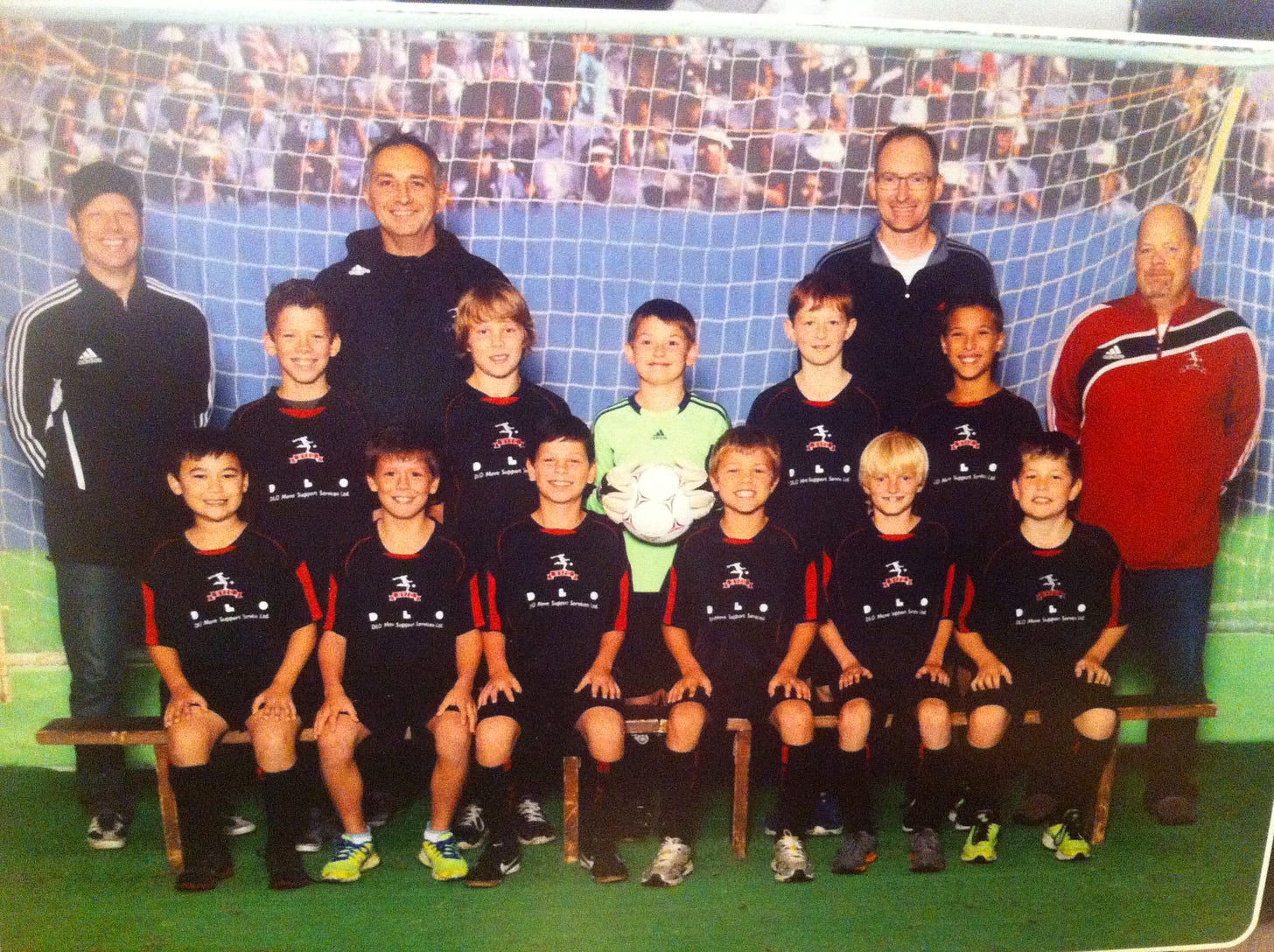
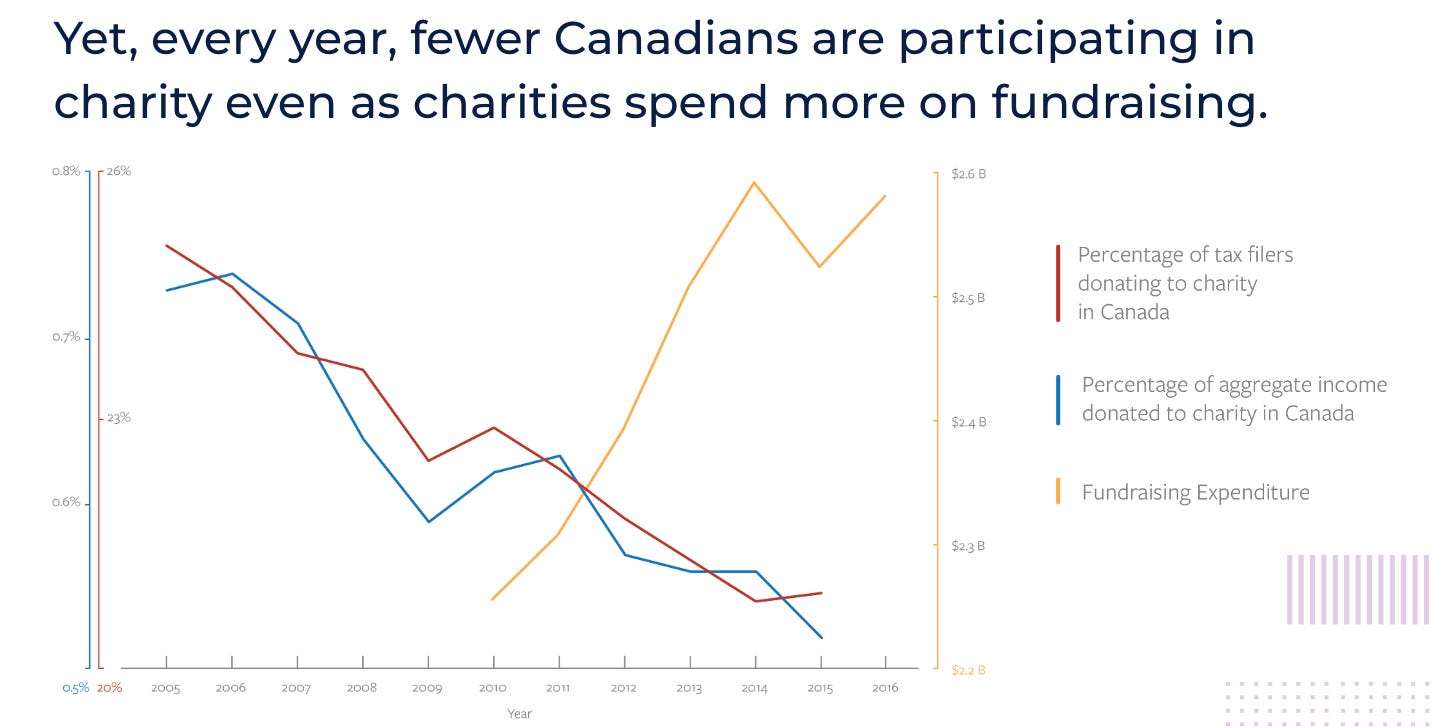
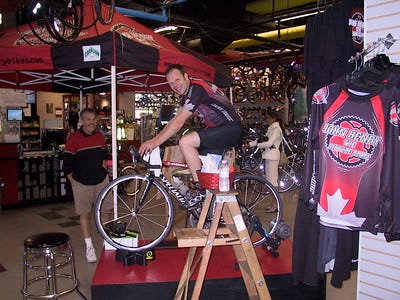
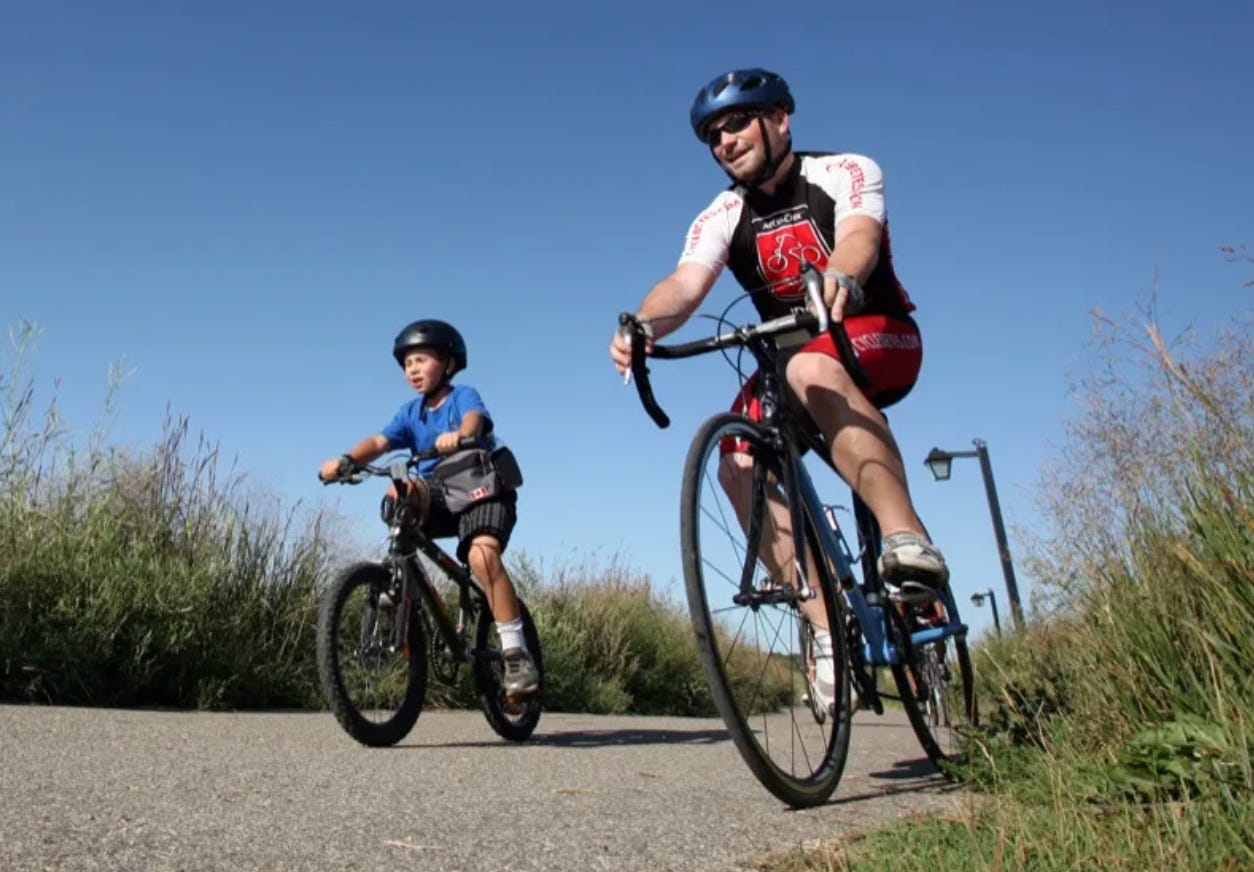
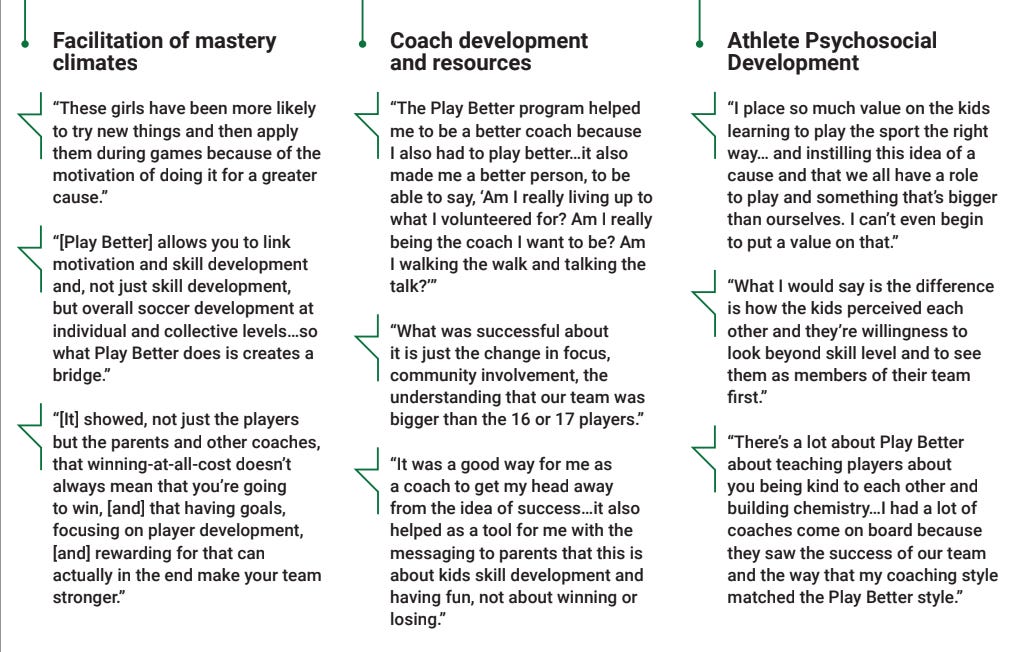
This is a powerful insight. Reframing sports from "score today and I'll buy you ice cream," to collective giving transforms development.